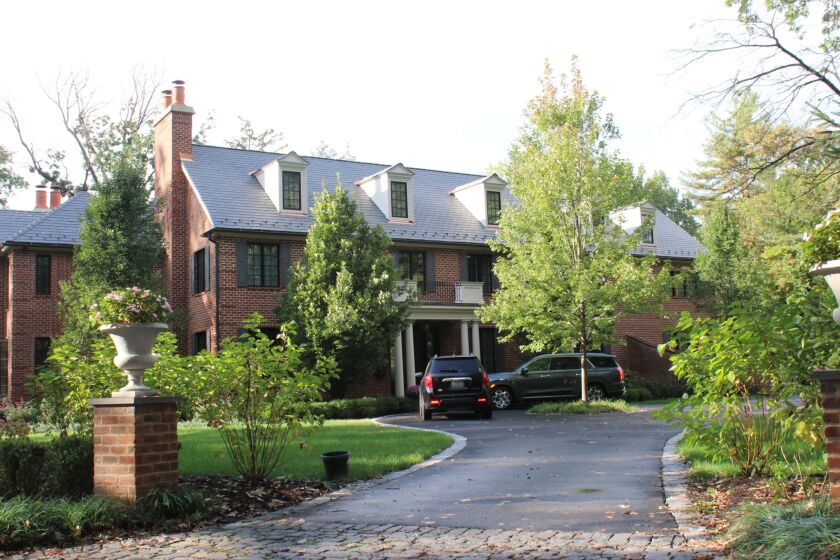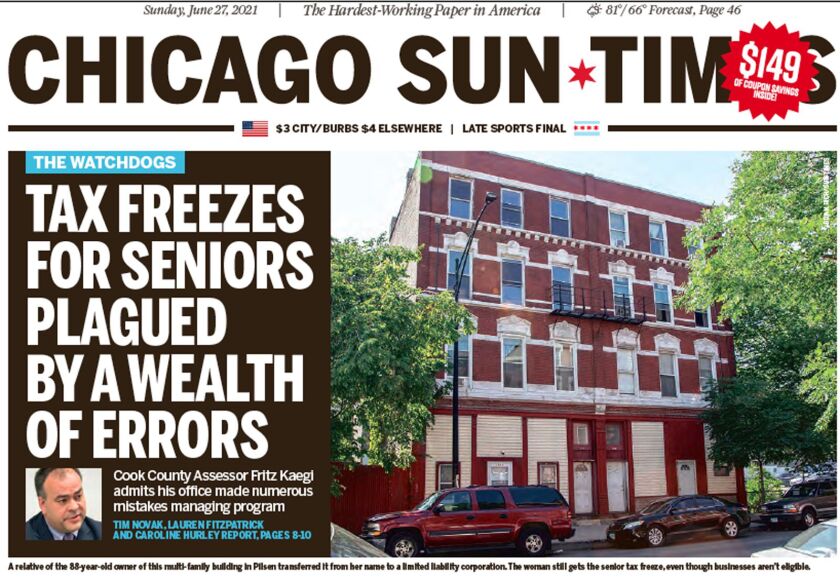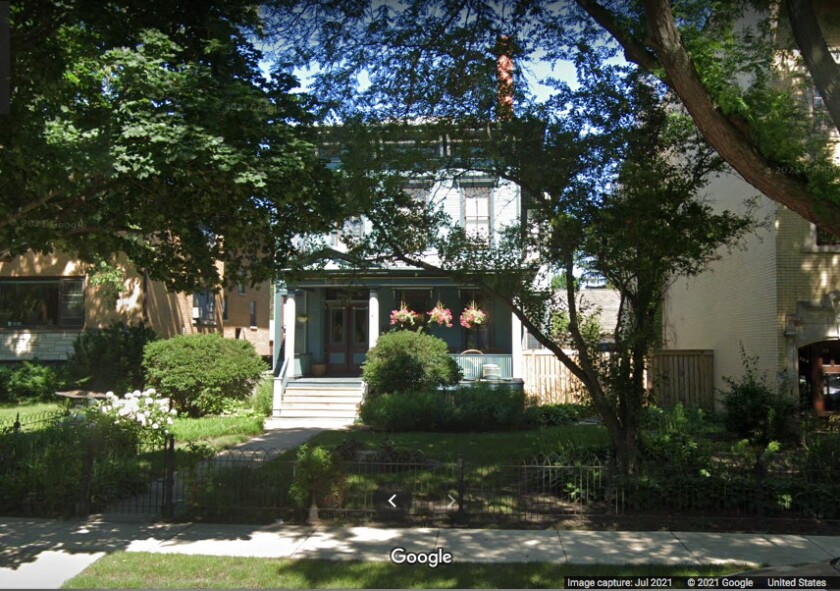Cook County Assessor Fritz Kaegi has been giving property tax breaks to some disabled veterans whose homes are too expensive to qualify for them.
One of them is a vet who got a five-figure property tax break this year and just sold his Winnetka home for $4.5 million.
Other veterans receiving similar tax breaks live in homes the assessor values at more than $1 million.
A state law the Illinois Legislature passed six years ago offers property tax breaks to disabled vets who qualify. It wipes out the tax bills on their homes entirely if the federal Department of Veterans Affairs certifies they are at least 70% disabled.
The law puts a limit on how expensive a home can be to qualify for the break. It has to have “an equalized assessed value of less than $250,000” — which translates this year in Cook County to a market value of about $775,000. The county assessor determines the market value and the assessed value. And the state applies what’s called a multiplier to equalize assessments from one county to another statewide.
But in dozens of instances every year, Cook County has ignored that limit under former Assessor Joseph Berrios and now under Kaegi, a fellow Democrat who challenged and defeated him, promising tax reform, doling out these tax breaks to disabled vets living in homes too expensive to qualify under the Illinois law.
As a result, those vets have gotten tax breaks they didn’t qualify for, deeply discounting or erasing their property taxes by as much as $28,000 this year.
That leaves other property owners to collectively make up the difference to fund school districts and other government taxing bodies.
The number of ineligible homes getting those tax breaks has shot up under Kaegi, according to a Chicago Sun-Times analysis of property tax bills since 2015.
Since Kaegi took office Dec. 3, 2018, he has given 126 tax breaks to disabled veterans whose homes’ value exceeds the limits spelled out in state law, shifting $1.7 million in taxes onto other property owners in Cook County. Berrios gave 38 tax breaks to disabled vets whose homes weren’t eligible under the law, shifting $517,071 in taxes, the Sun-Times analysis found.

Cook County Assessor Fritz Kaegi gave the disabled veterans property tax break to the owner of this 12,000-square-foot home even though the value his office put on the house was too high to qualify. That reduced the owner’s property taxes this year by $17,533, cutting his bill to $49,889. He sold the six-bedroom house over the summer for $4.5 million.
Lauren FitzPatrick / Sun-Times
In Winnetka, Kaegi gave the disabled veterans property tax break to the owner of a 12,000-square-foot home the assessor’s office valued at just over $3 million. It was the third year in a row Kaegi gave the owner the disabled vets tax break, which reduced his property taxes this year by $17,533, cutting his bill to $49,889.
The homeowner — an Air Force veteran who manages investments for wealthy individuals — sold the six-bedroom house four months ago for $4.5 million.
Using an abbreviation for the term equalized assessed value, Kaegi’s website says the tax break is available for disabled veterans whose homes “have a total EAV of less than $250,000 for the primary residence.”
His office assessed the Winnetka home at $301,352 this year, which, under the formula used for the tax calculations, the Illinois Department of Revenue more than tripled to come up with an equalized assessed value of $971,378.
Assessors in Chicago’s collar counties say they would have disqualified the Winnetka property — and any other home valued at more than $750,000 — from getting the disabled vets exemption.
Helen Krengel, DuPage County’s supervisor of assessments, says that’s because she follows the rules set out by the state revenue department, which provides a standard application for the tax break.
“It’s on their application as well,” Krengel says. “On the reverse side of it, it pretty clearly states that the EAV must be less than $250,000.”
Assessors in Will, McHenry, Kane and Lake counties say they also disqualify applicants for the disabled vets exemption whose homes exceed that value, as set out in the legislation passed by the Illinois General Assembly. Then-Gov. Bruce Rauner, a Republican, signed the tax break into law, and his revenue department issued guidelines in 2016 for county assessors to determine who qualifies.
The revenue department, now operating under Democratic Gov. J.B. Pritzker, says in a written statement: “The county assessment offices . . . should be following the laws as they are written.”
State Rep. Michael Zalewski, D-Riverside, who chairs the Illinois House Revenue Committee, says the disabled veterans tax break should be uniformly applied in all counties: “There should be one standard.”
Kaegi’s office says it’s continuing policies established by Berrios to cut property taxes for all homeowners who have a disability rating from the VA of at least 30% — regardless of the home’s value but applies the tax break only “for the portion of the home’s value up to $250,000 of equalized assessed value,” Kaegi spokesman Scott Smith says.
Of the 49 homeowners who got the disabled veterans exemption this year on homes whose equalized assessed value topped $250,000, 34 received the same tax break the previous year. It was automatically rolled over under a state law that was passed because of the COVID pandemic.
“To rescind this property tax relief from disabled veterans in the midst of a pandemic, without prior notice to property owners, would have been burdensome and likely generated legal challenges as some have relied upon the assessor’s longstanding application of the statute,” Smith says.
He says Kaegi also didn’t want to change policy during the pandemic.
Smith says Kaegi would like Illinois lawmakers to clarify the law regarding whether he should stop cutting taxes for disabled veterans whose homes exceed the $250,000 figure.
And he says the $1.7 million in taxes that other Cook County property owners are covering as a result doesn’t add much to their bills.
“The additional tax burden to non-veterans . . . due to this ambiguous language amounts to pennies on the average tax bill,” Smith says.
The revenue department’s guidance, from 2016, appears straightforward on the matter, saying: “By statute, the EAV of the primary residence must be less than $250,000 to qualify for the” disabled veterans exemption.
A financial manager by profession, Kaegi campaigned ahead of his 2018 victory on promises of reform, writing in a candidate questionnaire, “My top priorities are to make our assessment system ethical, transparent and fair. First of all, we want to run a model that will be more accurate and less regressive.”
Seeking re-election, Kaegi said in September that he’s “proud of our work transforming the old, broken property tax system into one based on fairness, transparency and ethics.”
In June, responding to a Sun-Times investigation, Kaegi acknowledged that his office had made numerous errors in calculating a different tax break — the senior freeze property tax exemption for homeowners over 65 whose income is under $65,000. At first, he blamed the county’s decades-old mainframe computer for miscalculating breaks. He later chalked up the discrepancies to “policy decisions” made by his predecessors.

Click here to read the June 27 Sun-Times report on errors in Cook County Assessor Fritz Kaegi’s handling of senior property tax freezes.
Among the errors, senior freezes had been granted in some cases not to individuals but to businesses, which aren’t eligible. His office also had frozen some property assessments based on the value of buildings that had been torn down and replaced with new construction.
Responding to other county officials who questioned the validity of property assessments ahead of preparing the tax bills that were due Oct. 1, Kaegi told them in July that “we have ensured that properties with any exemptions — not just the senior freeze — are receiving the correct exemption on the second installment tax bill.”
Among the homes that got disabled veteran tax breaks from Kaegi this year despite being valued higher than the law allows for them to qualify:
- The owner of a 44th-floor Gold Coast condo that he bought for $1.8 million in 1999 has received the disabled veterans tax break for six years under Berrios and Kaegi despite not being eligible for it because his condo’s EAV ranged from $445,754 to the current figure of $636,205. This year, the tax break saved him $17,278 — a 40% discount on his total tax bill of $43,968.

The owner of a 44th-floor condominium in this Gold Coast building — which he bought for $1.8 million in 1999 — has received the disabled veterans tax break for six years despite not being eligible for it because its “equalized assessed valuation” ranged from $445,754 to the current figure of $636,205. This year, the tax break saved the owner $17,278 — a 40% discount on his total tax bill of $43,968.
Google Maps
- An Oak Park homeowner who in 2018 bought his five-bedroom house out of foreclosure for $657,000 has gotten the break for two years. This year, the disabled veterans exemption saved him $28,313, leaving him with a tax bill of $1,531 on his home, which has an EAV of $273,522.

The owner of this five-bedroom house in Oak Park saved more than $28,000 on his taxes this year because Cook County Assessor Fritz Kaegi gave him the disabled veterans property tax exemption even though the value of his home was too high to qualify. He ended up with a property tax bill of $1,531.
Google Maps
- A couple living in a downtown high-rise unit on the Chicago River that they bought for $1.3 million in 2002 have been getting the disabled veterans exemption for three years despite never qualifying. The tax break saved them $17,335 this year — more than any other disabled veteran in Chicago — leaving them with a tax bill of $7,663.
The Sun-Times reported last weekend that 8,542 homeowners in Cook County qualified for a tax break this year under the disabled veterans exemption, including 6,083 homeowners whose tax bills were reduced to zero.
Among the homeowners exempt from paying any property tax as a result of the disabled veterans exemption are U.S. Sen. Tammy Duckworth and former Chicago Ald. James Balcer, who, because of war injuries in Iraq and Vietnam, have both been classified as at least 70% disabled by the VA. They and others will continue to pay no property taxes as long as the VA certifies their disabilities and the assessor values their homes under the state law’s limits.
Former state Rep. Jack Franks, who drafted the bill to erase property taxes for disabled veterans, says he never intended for the law to give tax breaks to people who owned homes worth more than $250,000 regardless of the equalized assessed value.
“Certainly, we have to honor those who were harmed defending our country, but this has gone much farther than that,” Franks says. “I was worried about them losing their house because our property taxes are so much higher than other states.”
Franks — who left the legislature in 2016 to serve as chairman of the McHenry County Board and lost a re-election bid last November — says he didn’t realize his legislation opened the program to those with high-priced homes.
“I’m an idiot. It’s all my fault,’’ Franks says. “People who can afford a $600,000 house don’t need a tax break.
“There are so many loopholes in this. I never intended for people who are living in $600,000 homes to avoid paying property taxes. I don’t think it’s fair because everybody else is paying for it.”








